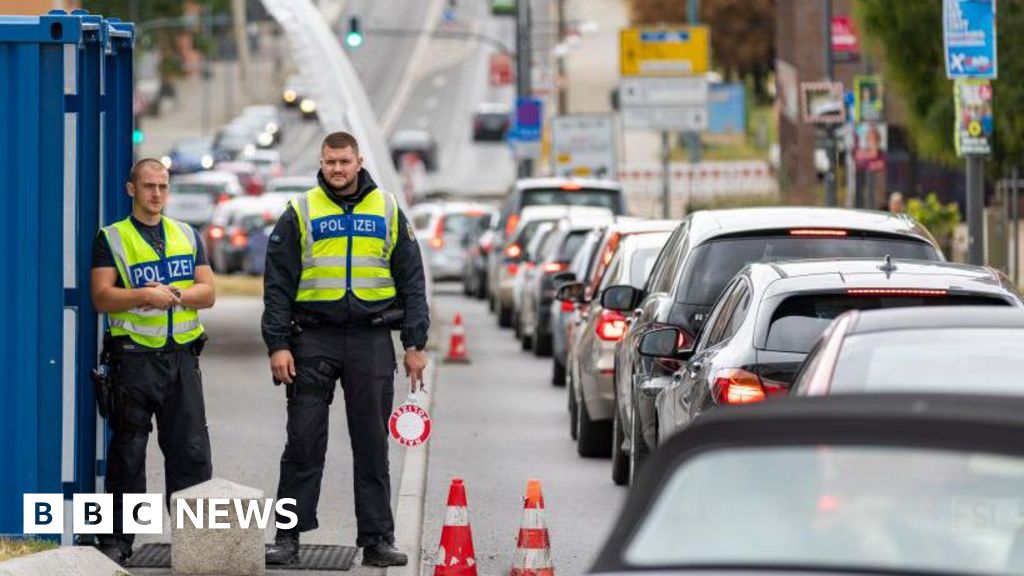Polish Prime Minister Donald Tusk condemned Germany’s decision to extend temporary controls to all its land borders as part of a response to irregular migration as “unacceptable”.
He was one of several from neighboring countries to criticize the move. Restrictions already in place at some of Germany’s land borders will apply to France, Belgium, the Netherlands, Luxembourg and Denmark from Monday.
The head of the Alliance of Communities on the Dutch-German border said it was a “panic reaction”, while Austria’s interior minister stressed that no one rejected by Germany would be accepted.
However, Germany’s conservative opposition said Berlin was not doing enough.
The three parties in Chancellor Olaf Schulz’s government are under increasing pressure to respond to poor results in elections in Germany’s eastern state, where immigration is the biggest problem.
In Thuringia, the far-right Alternative for Germany party holds the top spot, ahead of another election in Brandenburg in less than two weeks.
Three people were killed at a festival in Solingen in western Germany, sparking debate over immigration, and a failed Syrian asylum seeker who should have been deported was arrested.
The conservative CDU/CSU initially said they would attend a summit of government and state leaders on immigration on Tuesday aimed at reaching an agreement on next steps.
But they withdrew, accusing the government of not taking seriously conservative proposals to reject asylum seekers at the border.
“It is clear that the federal government is hopelessly divided and cannot agree on effective measures,” CDU leader Friedrich Merz said.
Germany and all of its neighbors are part of the Schengen border-free area and bound by EU rules Temporary controls allowed ‘as a last resort’ Measurements are taken in exceptional circumstances for up to six months.
German Interior Minister Nancy Feser explained that the expanded controls would prevent “the grave danger posed by Islamic terrorism and serious crime.”
Under the plan she proposed to Germany’s 16 states, police would check whether asylum seekers have already sought protection in another EU country and, if so, quickly start procedures to deport them.
However, the Polish prime minister left no doubt that the measures were triggered by “Germany’s internal political situation… rather than our policy against illegal immigration at the border”.
Since 2021, Poland has faced a surge in illegal immigrants crossing the Belarusian border, which it considers part of a “hybrid war” waged by Belarus and Russia. Many immigrants went to Germany.
Donald Tusk told a meeting of Polish diplomats in Warsaw that he would request urgent consultations with all affected countries.
European Commission spokesperson Anita Hipper said any reintroduction of border checks must be consistent with Schengen rules, so while Germany’s measures are possible, “these controls must be necessary and proportionate”.
In Austria, where the far right leads in opinion polls ahead of the Sept. 29 election, Interior Minister Gerhard Karner said he had instructed the police chief not to bring back anyone rejected by Germany.
“There is no room for it,” he told the Frankfurter Allgemeine Zeitung newspaper.
Joris Bengevoord, the mayor of the Dutch border town, said there were already delays at the German border during the UEFA Euro 2024 football tournament this summer when Germany implemented temporary border checks.
“At some border crossings, waiting times are as long as half an hour,” said Bengwold, chairman of the Union of Eurigios on the German-Dutch border town.
Dutch transport group TLN accuses Germany of breaking the Schengen agreement.
Some right-wing political leaders in the Netherlands hold a different view.
“If Germany can do it, why can’t we?” asked Geert Wilders, whose anti-immigration far-right Freedom Party came first in last year’s Dutch election and is now in government part of. “As far as I’m concerned, the sooner the better.”
Dilan Yesilgöz of the center-right liberal party VVD is also keen on the “super interesting” German plan. She said it sent a message that the government wanted control, even if the political symbolism itself was little help.

